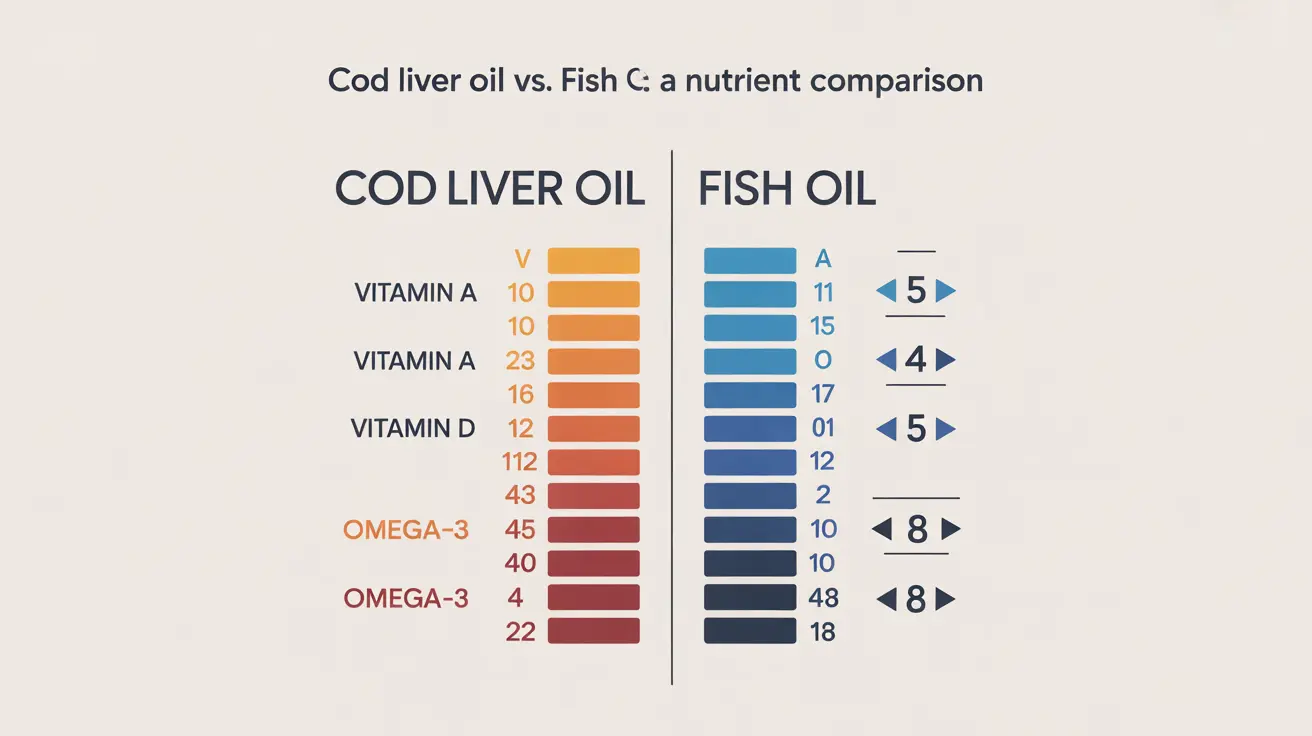When it comes to omega-3 supplements, both cod liver oil and fish oil are popular choices. However, these supplements have distinct differences in their nutrient profiles and potential health benefits. Understanding these differences is crucial for making an informed decision about which supplement best suits your specific health needs.
This comprehensive guide examines the unique characteristics of cod liver oil and fish oil, helping you understand their individual benefits, potential risks, and how to choose between them.
Key Nutrient Differences
The primary distinction between cod liver oil and fish oil lies in their vitamin content and omega-3 fatty acid concentrations. Cod liver oil naturally contains significant amounts of vitamins A and D, along with omega-3 fatty acids. Fish oil, on the other hand, primarily provides omega-3 fatty acids EPA and DHA, with minimal to no vitamin content unless fortified.
Cod Liver Oil Composition
Cod liver oil typically contains:
- Vitamin A: 4,000-10,000 IU per tablespoon
- Vitamin D: 400-1,000 IU per tablespoon
- Omega-3 fatty acids (EPA and DHA): 500-1,000 mg per tablespoon
Fish Oil Composition
Fish oil generally provides:
- Higher concentrations of omega-3 fatty acids (1,000-2,000 mg per tablespoon)
- Minimal to no naturally occurring vitamins
- More concentrated EPA and DHA content
Health Benefits Comparison
Cardiovascular Health
Both supplements support heart health, but their mechanisms differ slightly. Fish oil's higher concentration of omega-3s makes it particularly effective for maintaining healthy cholesterol levels and supporting cardiovascular function. Cod liver oil provides additional benefits through vitamin D, which also plays a role in heart health.
Bone and Joint Health
Cod liver oil has a unique advantage in supporting bone health due to its vitamin D content, which aids calcium absorption. Both supplements help reduce inflammation in joints, but cod liver oil's combination of vitamins and omega-3s may provide more comprehensive support.
Brain Function
The omega-3 fatty acids in both supplements support cognitive function and brain health. However, fish oil's higher concentration of EPA and DHA might make it a preferred choice for specific brain-related benefits.
Safety Considerations
While both supplements are generally safe, cod liver oil requires more careful dosing due to its vitamin A content. Excessive vitamin A intake can lead to toxicity, making it essential to monitor total daily intake, especially if taking other vitamin A-containing supplements or consuming vitamin A-rich foods.
Recommended Dosages
- Cod liver oil: 1 teaspoon to 1 tablespoon daily, depending on the product's concentration
- Fish oil: 1-2 grams of combined EPA and DHA daily for general health maintenance
Frequently Asked Questions
What are the main differences between cod liver oil and fish oil in terms of nutrients and health benefits?
Cod liver oil contains significant amounts of vitamins A and D along with omega-3 fatty acids, while fish oil primarily provides concentrated omega-3s without additional vitamins. This makes cod liver oil more of a multifaceted supplement, while fish oil focuses specifically on omega-3 benefits.
Which is better for increasing omega-3 fatty acids intake: cod liver oil or fish oil?
Fish oil typically provides higher concentrations of omega-3 fatty acids per serving, making it more effective for specifically increasing omega-3 intake. However, cod liver oil offers a balanced approach with additional vitamin benefits.
Can taking cod liver oil cause vitamin A or D toxicity, and how can this be avoided?
Yes, excessive cod liver oil intake can lead to vitamin A toxicity. To avoid this, stick to recommended dosages, consult with a healthcare provider, and consider your total vitamin A intake from all sources, including diet and other supplements.
How do cod liver oil and fish oil support joint, heart, and brain health differently?
Both supplements support these areas through omega-3 fatty acids, but cod liver oil provides additional benefits through vitamins A and D. Fish oil's higher omega-3 concentration may be more beneficial for specific cardiovascular and cognitive concerns.
Should I choose cod liver oil or fish oil based on my needs for vitamins A and D supplementation?
If you specifically need vitamins A and D along with omega-3s, cod liver oil is the better choice. If you're primarily seeking omega-3 benefits and already get sufficient vitamins from other sources, fish oil might be more appropriate.




